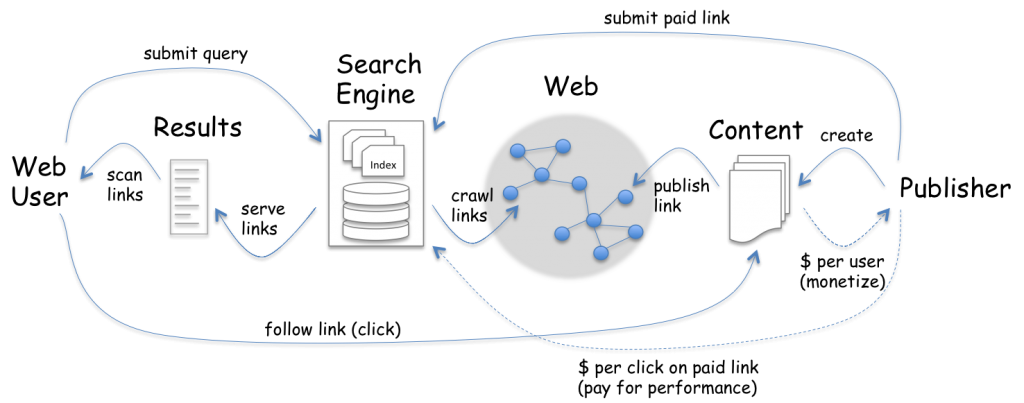“Search engines like Google interpret links to a web page as objective, peer-endorsed and machine-readable signs of value. Links have become the currency of the Web. With this economic value they also have power, affecting accessibility and knowledge on the Web.” Links and Power: The Political Economy of Linking on the Web
The interpretation of content on the web as a link that can be exchanged for value is a powerful abstraction and it helps understanding search, social media and the ever-evolving shape of the web. It is also the ultimate manifestation of how the web has commoditized content and it’s publishing.
Publishers create links by publishing content on the web that can be hyperlinked. Links can be followed, aggregated, shared as well as transformed and their value can be calculated. Links pass value between publishers.
The engine to calculate the value of a link on the information web is Google. Google by attaching its engine to hyperlinks – the fabric of the web – has become the dominant link aggregator.
The external representation of the value of a link as calculated by Google is its position in search results. Today’s search engines use very sophisticated machine learning algorithms that are trained to determine what’s valuable and what is not. The original Page Rank used by Google has become one signal among numerous.
Through its auction model Google allows publishers to bid for a more prominent positioning in its result sets, i.e. publishers can increase the value of their link on the web by paying Google.
As a note aside: link aggregation has centralized the de-centralized organized web in the index of search engines; think about the impact of search engines being down.
The commercial impact of link aggregation has spawned a whole industry centered on SEO/SEM and their different tactics to increase the value of a link. The commercial impact also has started to cause problems in the ecosystem in form of link farms and exchanges that try to game search engines.
The market of links created by search engine is efficient today. SEO and SEM are well known techniques and service providers are readily available and tools such as Google analytics have created transparency. This means that it becomes harder for all participants to find additional value beyond what is extracted today.
- Search engine will have to find new areas of growth. Google for example has announced the transition of Google Shopping to a paid inclusions model – publishers pay to have their link in Google’s result set. This experiment is a profound change and has to be understood as a step to capture more of the value of commercial links with obvious implication for other verticals and web search.
- SEO/SEM is a must for online retailers and it has become hard to turn it into a competitive advantage today. One reason I believe that online retailers have to look elsewhere for low-cost traffic, i.e. find ways to better engage on social.
- Traffic arbitration, the buying of low-cost traffic (keywords) on search engines and selling it at higher price to other sites, will see diminishing returns, which will hit comparison-shopping sites.
The web is rapidly changing from being just a source of information consumption to a place where people produce, consume, share and interact. The social web started changes the link economy as defined by Google and it started with Blogs.
Blogs have always been a unique part of the link economy besides offering users the ability to become publishers. Blogs created a loose system of value exchanges through reciprocal linking.
It is an interesting point of view [pdf] that Google decision to no-follow links in the comment section of blogs has been the starting point for a complete new set of link discovery services such as bookmarking and sharing sites.
Platforms such as Facebook, Twitter and Pintrest have taken link sharing to a new level with their social buttons and user specific activity feeds. These new players are becoming link aggregators themselves thus are changing the way links are valued.
A second force is changing the link economy – mobile. Mobile with is native apps as content representation breaks the hyperlink model and in doing so disrupts the link economy.
